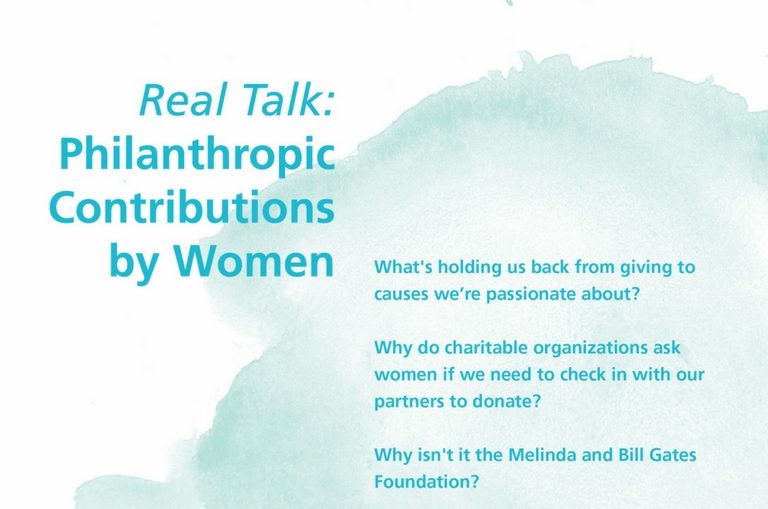[tweet_box design=”default”]“Success is best when it’s shared” ~ Howard Schultz[/tweet_box]
There is good in all of us. Particularly in Canada, we all make an effort to help those in need, whether it’s making donations, attending fundraisers or volunteering with a community group. While many of us long to do more, taking greater action to tackle the struggles, injustice and suffering in the world can be daunting if you don’t have a plan.
Our research shows that many women face obstacles when it comes to engaging directly in philanthropy on a larger scale. Overall, the most frequent explanation for philanthropic absenteeism is lack of time and clarity. In addition, some feel that their family’s philanthropic endeavours have been taken care of by their partners. Some are pushed into or accept minor positions even though they have the skills, know-how and resources to take on a leading role. Some simply dislike the spotlight and prefer not to have their names recognized when cutting a large cheque. Meanwhile, most of those who donate do so without any rhyme or reason.
These are all legitimate concerns, but that doesn’t mean you should let them stand in your way. If you are fortunate to be in a position to make a greater impact through philanthropy, we say it’s time to break down the barriers and create a plan to make it happen.
[tweet_box design=”box_03″]Many women face obstacles when it comes to engaging directly in #philanthropy on a larger scale. #RubachWealth research[/tweet_box]
Overcoming the obstacles
There are many questions and concerns that may be stopping you from taking significant philanthropic action. However, with answers to your questions and guidance to help you move forward, there is no reason for these worries to hold you back.
Here are some common worries that keep women from fulfilling their philanthropic objectives, along with insights on how to move past them:
Lack of time.
When you are a multitasker trying to wear countless hats, time can be your greatest enemy. You may have a strong desire to support a particular cause, along with ideas and money to make it happen, but where are you supposed to find the time to research, plan and engage in yet another initiative? For one thing, you can seek out help from a financial advisor or others to take on some of the work of turning your philanthropic objectives into reality.
Fear of over-committing.
Committing a significant amount of your time or money to philanthropy can be scary when there is uncertainty surrounding markets, careers or family dynamics. All of these factors can introduce an element of perceived financial instability. However, with sound planning, trusted advice and flexible safety mechanisms in place, it is possible to make a major philanthropic gift while ensuring that your family’s financial needs will always be well looked after.
Overwhelming choice, not enough clarity.
With the myriad of pleas to end poverty, protect the environment, care for animals, cure diseases and end wars, how are you supposed to decide where to direct your resources? One place to start is by considering where you can have the greatest impact. Perhaps you have existing connections in a particular field or ideas for an innovative approach to tackling an existing challenge. Talking things through with trusted friends or advisors may also help to narrow your focus and reveal a clear path forward.
Concerns about where the money goes.
If you are going to make a major financial contribution to a cause, you want to be sure that your money will be put to good use rather than disappearing into an organization’s expensive bureaucracy. It might take extra effort, but researching expense ratios and seeking assurances about how your money would be spent are an important part of the philanthropy due diligence process. While large organizations may have more bureaucracy than small charities, they may also have a greater impact due to their wider reach.
A desire to see the impact first-hand.
When people are hurting or in need, there is understandably a desire to help right now. It can be difficult to focus on long-term outcomes when people are going hungry before your eyes. Philanthropy at its best is about addressing these urgent cries for help as quickly as possible, but doing so in a sustainable manner. With a hybrid solution, you can take heart in immediate results while also working toward long-term solutions. This will have a much greater impact in the long run compared to short-term efforts that focus solely on fighting fires here and now.
[tweet_box design=”box_03″]If you are fortunate to make a greater impact through #philanthropy, don’t let concerns stand in your way. #RubachWealth [/tweet_box]
Finding the right fit
So what does a good philanthropic initiative look like? It depends on what you are looking for. As a unique individual, your ideal way to engage in philanthropy may not be the same as anyone else’s.
You may already have found a cause or organization that you are passionate about, and you may already be donating to that cause. This is a good start. If you are going to be directing a significant amount of your time, energy or money toward philanthropy and supporting this cause, the following are some important considerations:
- The cause should be something that you find personally meaningful and compelling.
- You should have a clear understanding of the mission and impact of any organization you support before giving to ensure there is a good cultural fit.
- You need to have a plan, and what, how and when you give needs to fit this plan to ensure that it is financially sustainable and optimized from a tax perspective.
The leap from ‘planning to give’ to a Giving Plan
Successful philanthropy does not happen by accident – it starts with a plan. Your focus is on helping others, and at Rubach Wealth we want to help you navigate the giving process with confidence and a financially sound plan to maximize the impact of your efforts.
Aside from bringing about meaningful change, philanthropic giving also has many tax advantages for donors. When thoughtfully integrated into your estate plan, philanthropy enables you to have a significant positive impact in areas that are close to your heart while at the same time taking advantage of beneficial tax structures.
[tweet_box design=”box_03″]Successful philanthropy does not happen by accident, it starts with a plan. #RubachWealth #Philanthropy[/tweet_box]
Our team at Rubach Wealth designs flexible giving plans that evolve together with your financial situation and preferences. Your philanthropic objectives and capacity may change over time; with a good plan, changing beneficiaries and how much you give will not be an issue.
There are many obstacles that can make women hesitate to embrace philanthropy, but there are even more incredible reasons for seizing the opportunity to make the world a better place. If you’d like to learn more about how we can help you throughout this process, we invite you to get in touch. You have the potential to do so much good, and with a plan tailored to your needs and objectives, you can make a real difference.




